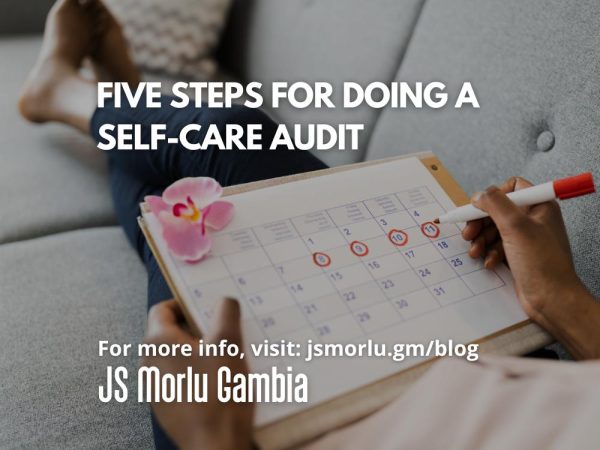You’ve invested in your business; now it’s time to invest in yourself.
Interest in self-care has been on the rise since 2016, with an unsurprisingly significant spike at the start of the pandemic. But when was the last time you considered how well your self-care practices were serving you?
If you’re an entrepreneur or otherwise ambitious person, you’re likely used to thinking about optimization when it comes to your career. But when was the last time you got serious about caring for yourself?
My early attempts at self-care were counterproductive.
Before I truly embarked on my self-care journey, my attempts were surface-level and usually very reactive as a result of pushing too hard. My days were a maze of multitasking, and I could never seem to catch up. The stress followed me, making me less productive, more anxious and more irritable. In short, all the things I’d sought to improve were instead getting worse, and I realized I was seriously burned out.
I had to make a change. For me, that meant setting boundaries at work so my day could end earlier and making “me time” in the morning so my day could begin more calmly and with intention. It also required me to learn to ask for help. Most importantly, it forced me to understand that determining the right approach to self-care takes time, sacrifice and the ability to truly put yourself first.
Let me be honest: This wasn’t easy. After all, I began my self-care efforts to be more present for everyone in my life—from my family to my colleagues. Initially, it felt wrong to focus more on me. Eventually, though, I realized that really taking time to be present with myself was the only way I could be there for the other people in my life.
How To Conduct Your Self-Care Audit And Make Me Time Work For You
Now, mornings are my me time. I can prepare my mind and body for the day by using those early hours to move, meditate, journal and set intentions. That being said, everyone is different, and your self-care routine should work for you. Maybe you’d prefer an evening or afternoon self-care ritual, or perhaps your me time works best when broken up into smaller moments throughout the day.
The key is to find what works for you and use the time wisely. Here are the five tips I recommend.
1. Ask yourself what part of your day currently feels the most frazzled.
A lot of us have a formidable ability to power through the most overwhelming parts of our days. It can feel counterintuitive to slow down and really feel that stress we’ve worked to suppress. However, when we pause and feel our feelings, we allow ourselves to gather clues about what’s causing our stress. This can help us better navigate, prepare for or cope with stressful triggers rather than feeling surprised by them every time.
2. Try to remember the last time you felt truly peaceful.
Our everyday lives are rarely constructed to promote peacefulness, but with the right tools, we can find ways to incorporate “luxurious” moments of calm into our daily lives. Try to remember the last time you felt truly relaxed—maybe you were at a yoga retreat, getting a massage or lounging by the pool on vacation. Take note of what sounds, smells and feelings you enjoyed.
While expensive wellness offerings and vacations aren’t always accessible, meditation apps and local well-being initiatives can often help us recreate these experiences. Consider designating a unique space in your home where you don’t bring work in, and fill it with your favorite textures and scents to create a luxurious and relaxing self-care zone.
3. Take a hard, honest look at your calendar.
Evaluate how you’re spending your time. Which commitments can you let go of? What can you ask for help with? If you feel anxious about this, know that you’re not alone—but that it’s also impossible to say yes to everything.
Maybe there’s a solo project at work that could use an extra set of hands or a family responsibility you’ve been shouldering alone that could be distributed more evenly. Sharing the weight can give you a chance to find time for yourself. Work on your ability to recognize when you’re beginning to feel overextended or burned out, and communicate with those around you to create opportunities for rest.
4. Consider what might stop you from investing time in yourself, and plan how you’ll respond.
Not everyone in your life will immediately understand or respect your new routine, and even those closest to you may push back. Clear, consistent boundaries are crucial to maintaining your commitment to self-care.
You may also find your roster of naysayers includes yourself. Self-doubt can get in the way of self-care, so remember that change takes time, effort and repetition. Leave yourself words of encouragement in your planner, on sticky notes or via automated reminders.
5. Write down your commitment to yourself in permanent ink.
Something about putting commitments in writing makes them feel more official. When I got serious about my me time, I started marking it on my calendar. In pen. If something unexpected comes up, my calendar reminds me that my commitment to myself and my self-care is nonnegotiable.
Self-care is not self-indulgence.
Approaching self-care with the same mindset you might use to achieve a career goal can help you avoid falling into the trap of self-indulgence. Self-care is not doing whatever you want whenever you want; it’s setting up a routine that can help you maximize and achieve your wellness goals—whether that’s being more mindful in your daily life or having more patience with your colleagues or kids. When self-doubt starts to creep in, think about how you would advise someone struggling to meet a career goal: Small daily micro-commitments can make a substantial difference in the long term.
Original Source: Forbes
